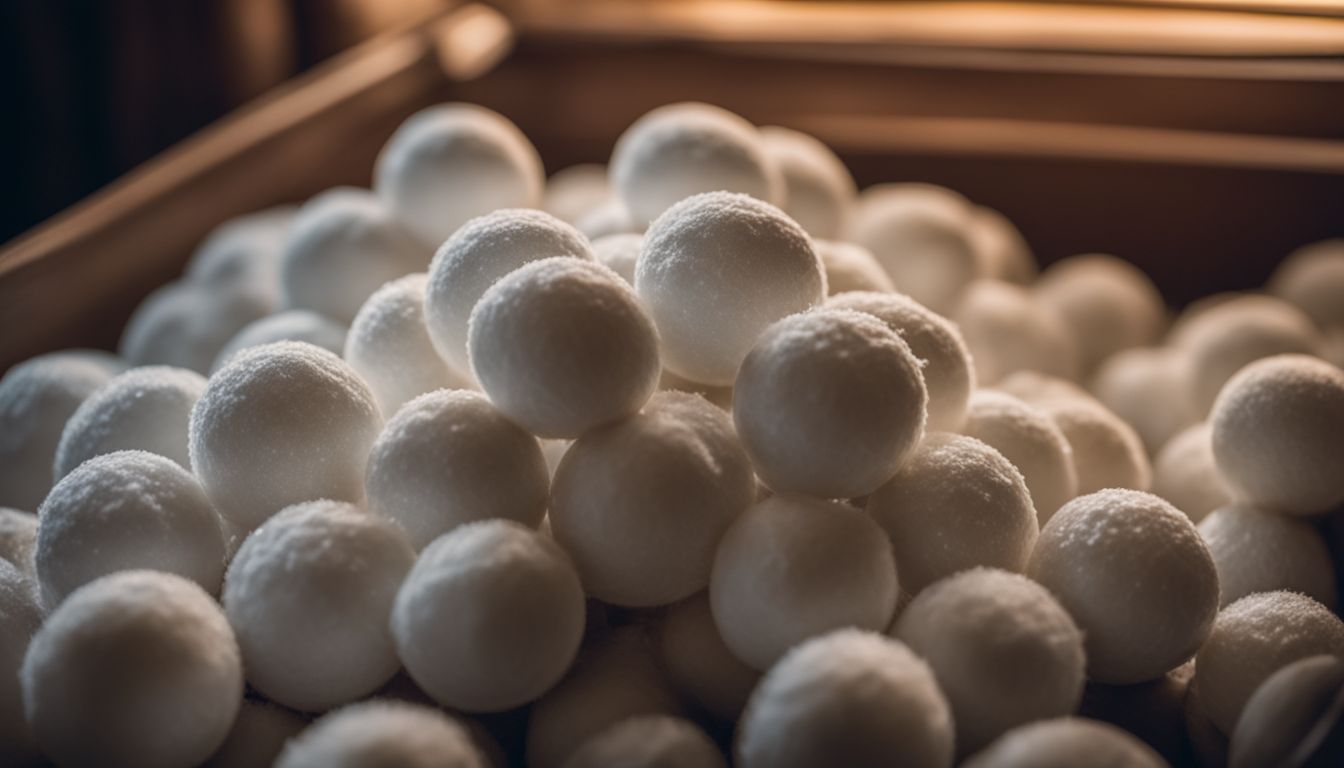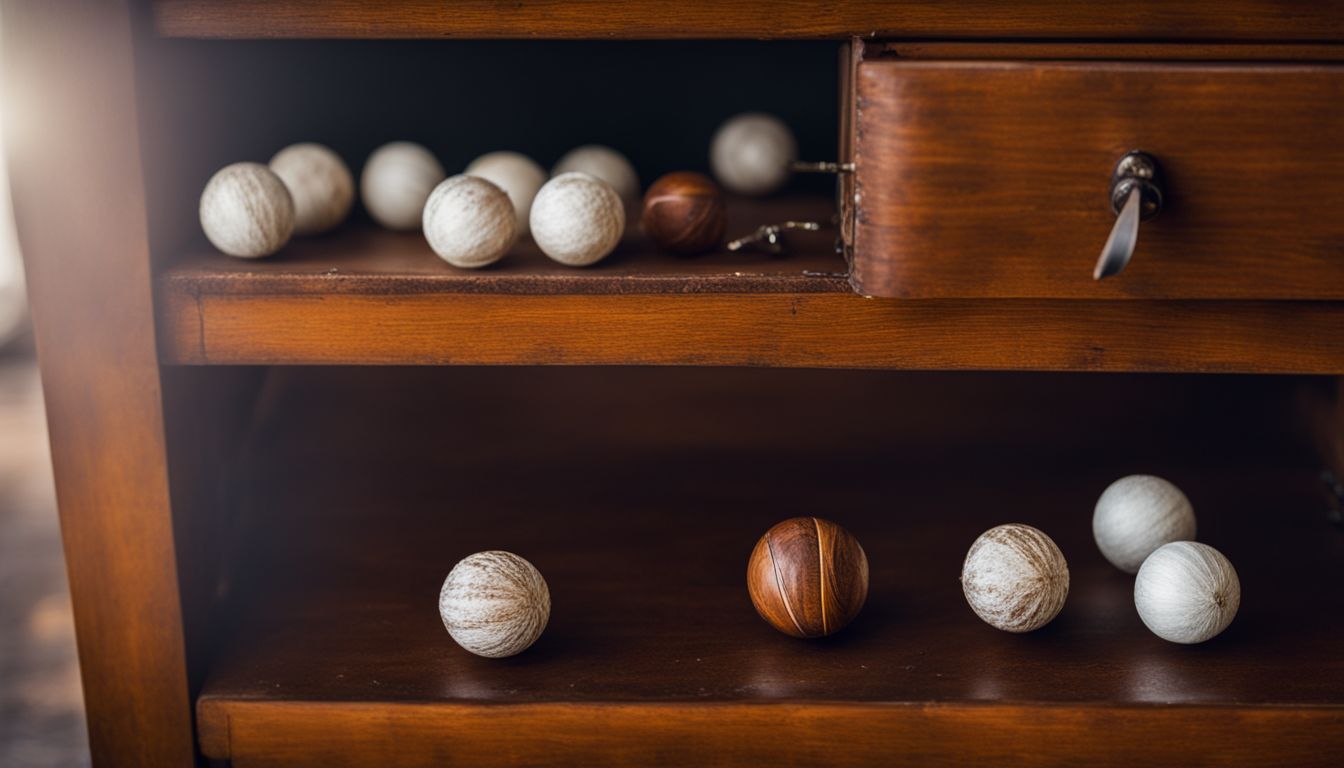Are you tired of spiders creeping around your home? Mothballs are often suggested as a spider repellent. This post will explore if they really help keep the eight-legged pests at bay and look into safer, effective alternatives.
Keep reading for some eye-opening insights!
Key Takeaways
- Mothballs are not an effective spider repellent. While they were made to protect clothes from moths, there is limited scientific evidence that they repel spiders.
- The chemicals in mothballs, such as naphthalene and paradichlorobenzene, can pose health risks to humans and pets if inhaled or ingested. Improper use of mothballs can lead to complaints and potential hazards.
- Safer alternatives for controlling spiders include natural repellents like peppermint oil, vinegar, or citrus spray. Professional pest control options offer a more comprehensive approach to managing spider populations.
- Consider the environmental impact when using mothballs for spider control; using safer options is essential in preventing environmental damage while addressing pest control needs.
Unveiling the Myth: Do Mothballs Keep Spiders Away?

Now that we’ve touched on spider repellents, let’s tackle a common belief. Many people think mothballs can keep spiders away. They use them in closets, attics, and basements hoping to get rid of spiders.
But here’s the truth: mothballs may not be the best choice for this job.
Mothballs were made to protect clothes from moths, not to scare off spiders. The smell might seem strong to us; however, there is no solid proof that it works well against spiders.
In fact, experts say mothballs aren’t effective spider repellents. They point out that using the right pest control methods is important if you want to keep spiders at bay. This means relying on things like natural pest control or calling an exterminator for help instead of using mothballs around your home.
Understanding How Mothballs Work

Mothballs are small balls of chemical pesticide that release a strong odor to repel insects and pests. The active ingredients in mothballs, such as naphthalene or paradichlorobenzene, sublimate at room temperature, which means they turn from a solid state directly into a gas, releasing the repellent vapor.
The Basics of Mothballs
Mothballs are small balls made to keep moths and other pests away from clothes and fabrics. They have a strong smell because they contain chemicals that pests don’t like. These chemicals can also make spiders want to stay away.
People use mothballs by putting them in closed spaces like closets or storage boxes. It’s important to know that these mothballs should not be used outside. Their ingredients could hurt animals and dirty the air and water.
The stuff inside mothballs is very powerful, so they must be handled with care. If not used right, they can cause health problems for people and pets who breathe in the fumes.
Now let’s talk about what goes into making mothballs – The Active Ingredients in Mothballs.
The Active Ingredients in Mothballs
Mothballs are made with strong chemicals called paradichlorobenzene or naphthalene. These ingredients are types of pesticides that kill moths and other insects. They work by turning from a solid into a gas that fills the air with their chemicals.
This is how they keep bugs away from clothes in storage.
These active ingredients can be harmful if people or pets breathe them in for too long. It’s important to use mothballs carefully, just like the directions say. This helps us stay safe and protects animals and nature too.
Now, let’s look at if these mothball chemicals actually help keep spiders away.
The Effectiveness of Mothballs Against Spiders
While some people claim that mothballs are effective at repelling spiders, there is limited scientific evidence to support this. Expert opinions on the use of mothballs for spider control vary, and it’s essential to consider the potential risks associated with their use.
Investigating the Claims
Many people claim that mothballs are effective at keeping spiders away, but there is little scientific evidence to support this. The active ingredients in mothballs, such as naphthalene and sulfur, may repel certain insects due to their strong odor, but spiders might not be as affected by these chemicals.
Additionally, the use of mothballs as a spider repellent can pose health risks if not used properly. According to the Better Business Bureau, improper use of mothballs has led to complaints and potential hazards because they are considered a harmful pesticide.
Experts advise against relying on mothballs for spider control due to their limited effectiveness and potential risks. Instead of using potentially harmful chemicals like mothballs, it’s important to explore safer and more effective alternatives for controlling spiders in the home.
Expert Opinions on Mothball Use for Spiders
Experts have varying opinions on using mothballs to repel spiders. While some experts believe that the strong odor of mothballs can deter spiders and other insects, others argue that the chemicals in mothballs can be harmful to humans and pets.
Additionally, it’s important to note that there is limited scientific evidence supporting the effectiveness of mothballs in repelling spiders specifically. Some experts recommend exploring safer alternatives such as natural repellents like essential oils or diatomaceous earth.
Moving on from expert opinions, let’s delve into the potential risks associated with using mothballs as spider repellents and explore alternative methods for controlling spider populations.
The Risks of Using Mothballs as Spider Repellents
Using mothballs as spider repellents may pose health risks, including respiratory irritation and potential toxicity to pets and children. Additionally, the environmental impact of mothballs should also be considered when using them for spider control.
Health Concerns
Using mothballs to repel spiders can pose serious health risks, especially when inhaled or ingested. The chemicals in mothballs, such as naphthalene and paradichlorobenzene, can harm humans and pets.
Exposure to these substances may lead to symptoms like headaches, nausea, dizziness, and even damage to red blood cells. Moreover, the Environmental Protection Agency has not approved the use of mothballs as a spider repellent due to these health concerns.
Environmental Impact
Mothballs, containing chemicals harmful to the environment, can cause significant damage when used for spider control. The release of toxic gas from mothballs can pose risks to the surrounding ecosystem.
Additionally, using mothballs in gardens or outdoor spaces may result in environmental harm due to their chemical composition and potential for leaching into the soil. Considering safer options is essential in preventing environmental damage while addressing pest control needs.
Now let’s explore how mothballs work against spiders and whether they are effective in repelling these pests.
Exploring Alternatives in Spider Control
Consider natural repellents like peppermint oil, vinegar, or citrus spray to deter spiders from your home. You can also encourage the presence of other insects that feed on spiders, or seek professional pest control options for a more comprehensive approach to spider management.
Natural Repellents
Mint, lavender, eucalyptus, and citronella are plants that spiders dislike due to their strong odors.
Role of Other Insects in Controlling Spider Populations
When considering natural repellents, it’s essential to understand that other insects play a crucial role in controlling spider populations. Predatory insects such as ladybugs, lacewings, and certain wasp species are natural enemies of spiders.
They help maintain the balance by preying on the pests that spiders feed on, thus indirectly contributing to managing spider populations. This process forms part of an intricate ecological system where various insects act as checks and balances for each other, ensuring a sustainable coexistence without any single group overpowering others.
Professional Pest Control Options
Professional pest control services offer effective solutions for managing spider populations in your home. Some options to consider include:
- Biological control: This method involves using natural predators of spiders, like certain species of insects or animals, to keep their population in check, reducing the need for chemical interventions.
- Natural chemical control: Utilizing natural substances such as essential oils or plant-based repellents to deter spiders from entering your living spaces can be an eco-friendly approach to pest management.
- Genetic control: This innovative method uses genetic modification to alter the reproductive capabilities of spiders, helping to reduce their overall numbers without harmful chemicals.
- Integrated pest management: This comprehensive strategy combines various pest control methods, including inspection, identification, and treatment, to effectively manage spider infestations while minimizing environmental impact.
Conclusion
In conclusion, using mothballs to repel spiders is effective but needs caution. Mothballs contain toxic chemicals that can be harmful to humans and pets. While they may work in specific areas, natural repellents or professional pest control options may be safer alternatives.
It’s important to follow safety guidelines and consider other methods for spider control.
Discover how the praying mantis can be a natural predator to control spider populations in your home.
FAQs
1. What are mothballs?
Mothballs are small balls made from chemicals that keep moths away from clothes.
2. Can you use mothballs to keep spiders away?
Some people think mothballs might help keep spiders away, but they’re really just for moths.
3. Is it safe to put mothballs around the house?
It’s not safe because the chemicals in mothballs can be bad for people and pets if they breathe them in or touch them.
4. What is a good way to keep spiders out of my home?
Keeping your home clean and free of spider food like bugs is a better way than using mothballs to stop spiders from coming in.




